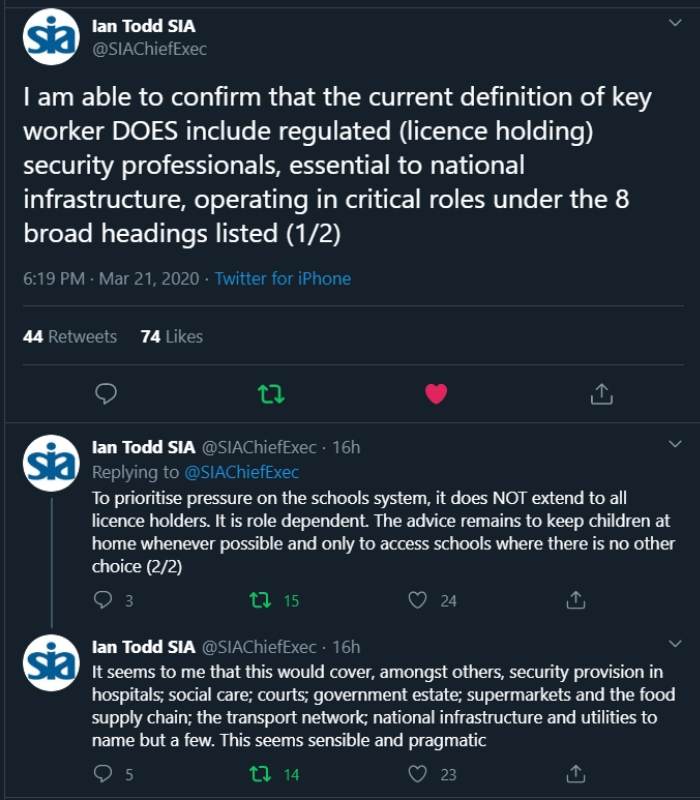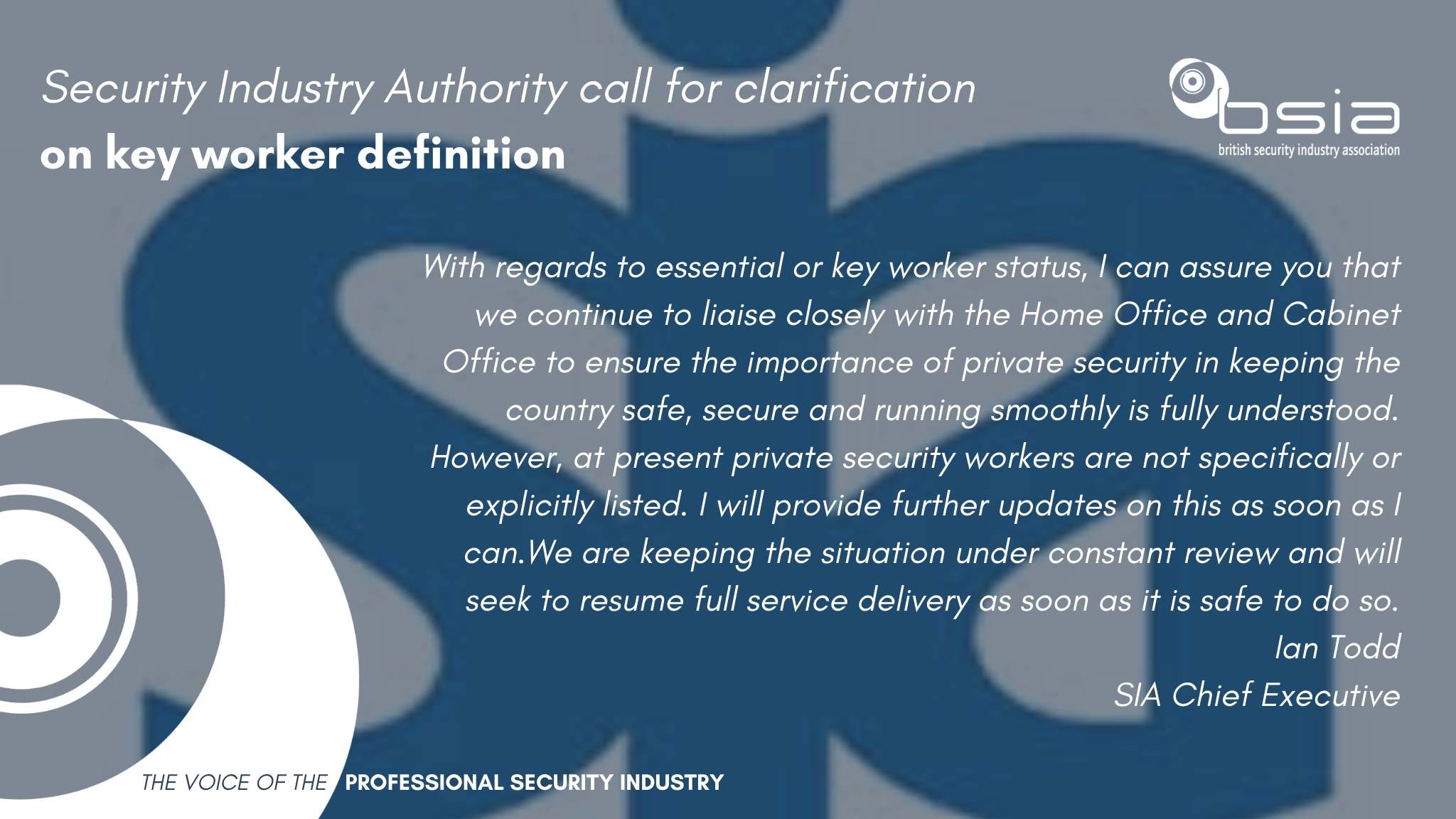Key Workers in the Industry
**This page is continuously being updated - if you would like to add information please contact [email protected]**
The BSIA is currently lobbying goverment on a variety of issues around the role and safety of our industry. We have sucessfully gained clarity on the definition of key worker in terms of our security personnel (see details below) and are currently lobbying on the following issues on your behalf:
Extension of the Job Retention Scheme
Key worker testing
Death in service
As you are aware, schools remain closed and will not being opening until at the earliest on 1 June with a phased approach and are currently only open to those whose parents are classed as ‘key workers’.
We will be monitoring the situation as the date gets closer to see if this has an inpact on our members and will communicate when we have more details.
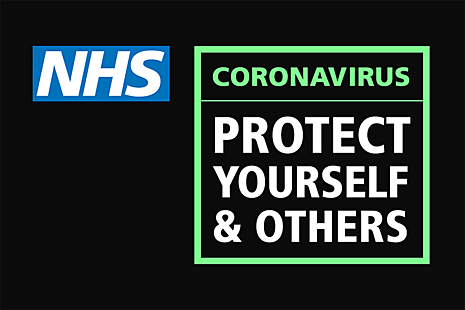
**Latest Update**
Coronavirus (Covid-19)
9 May 2020
The government has set out its plan to return life to as near normal as we can, for as many people as we can, as quickly and fairly as possible in order to safeguard livelihoods, but in a way that is safe and continues to protect our NHS.
Going to work / Safer spaces
Who is allowed to go to work?
In the first instance, employers should make every effort to support working from home, including by providing suitable IT and equipment as they have been already. This will apply to many different types of businesses, particularly those who typically would have worked in offices or online.
Where work can only be done in the workplace, we have set out tailored guidelines for employers to help protect their workforce and customers from coronavirus while still continuing to trade or getting their business back up and running. We will be publishing even more detailed COVID-19 secure guidelines in the coming days, which has been developed in consultation with businesses and trades unions.
These ‘back to work’ guidelines apply to those in essential retail like:
supermarkets
those in construction and manufacturing
those working in labs and research facilities
those administering takeaways and deliveries at restaurants and cafes
tradesmen, cleaners and others who work in people’s homes
those who are facilitating trade or transport goods
and so on
Non-essential retail, restaurants, pubs, bars, gyms and leisure centres will remain closed. They will reopen in a phased manner provided it is safe to do so.
There are specific guidelines for those who are vulnerable, shielding, or showing symptoms.
What is a critical worker?
Critical workers are those working in health and care and other essential services, who can still take their children to school or childcare and can use hotels and other accommodation services for work related purposes - for example if they can’t get home after a shift or need to isolate from their families. This critical worker definition does not affect whether or not you can travel to work – if you are not a critical worker, you may still travel to work provided if you cannot reasonably work from home.
Not all forms of work will return to normal at once. People will have to prepare for a new type of normal. We need to make sure that any changes we do make are carefully monitored and that we aren’t doing anything to increase the risk of infection and push the Reproductive value (R0) above 1. R0 describes how many people on average will be infected for every one person who has COVID-19.
We will ensure that businesses have time to prepare their premises to operate as safely as possible.
We will set out more detail about the phasing in due course.
26 March 2020
On Monday, 23 March the Prime Minister announced further instructions to the British public to combat the spread of Coronavirus (COVID-19). His announcement can be viewed here- this link opens in a new window. It places further restrictions on when people can leave their homes and limits travel for work to essential roles only.
I am able to confirm that the current definition of critical worker DOES include regulated (licence holding) security professionals, essential to national infrastructure, operating in roles under the 8 broad headings listed- this link opens in a new window. This status is only directly relevant to the ability to access the school and childcare systems at this time. This critical worker definition does not affect whether or not you can travel to work - if you are not a critical worker, you may still travel to work where this absolutely cannot be done from home.
To prioritise pressure on the schools system, it does NOT extend to all licence holders. It is role dependent. The list may change over time.
Government advice is to stay at home whenever possible. It is to keep your children at home whenever possible - even if you are a critical worker. If, and only if, you are undertaking an essential role, supporting the nation's COVID-19 response, which you can only do by accessing the school or childcare systems, should you do so as a critical worker.
This definition covers, amongst other areas, security provision in hospitals; schools; social care; courts; government estate; supermarkets and the food supply chain; the transport network; national infrastructure and utilities. If you are providing essential security to a service which itself remains critical and functioning, which attracts critical worker status, then you are likely to be covered. If in doubt, check with whoever contracts for your services.
Roles essential to supporting law and order, with the potential to reduce demand on policing, also meet the critical worker definition. This would include, amongst other areas, the guarding of empty or closed commercial, retail or office premises; the monitoring of similar through CCTV or other remote means; and the provision of alarm response centres including mobile units.
If your role does not clearly fall under the headings above then you may still travel to work, if that work absolutely cannot be done from home. Your aim should be to stay at home whenever possible. If this is not viable then assess whether you can deliver more services remotely e.g. through CCTV. If a physical presence is required then you should seek to minimise the number of staff deployed to the lowest safe level and ensure social distancing is applied.
Note that in any circumstance, critical worker or otherwise, the Prime Minister has been very clear that ensuring social distancing remains the responsibility of the employer.
These are difficult questions in unprecedented times. They are not easy and no-one else can answer them for you. You will need to apply judgement, with the aim of minimising social contact where possible. The words to focus on are 'necessary', 'critical' and 'essential', otherwise please stay at home and minimise the transmission risks for the benefit of your health, your families, the general public and the NHS.
Ian Todd
Chief Executive

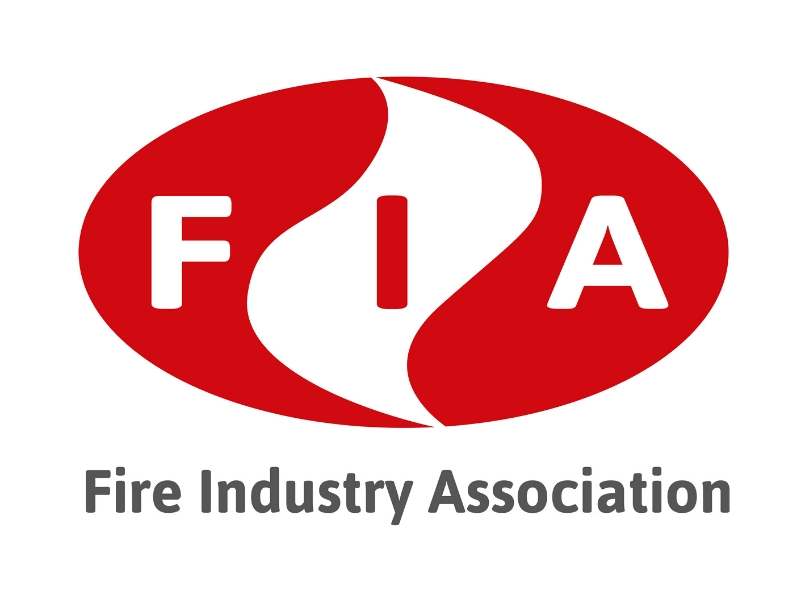
Home Office updates the FIA about Key Worker status of fire safety personnel
FIA CEO Ian Moore has been in discussions with the Home Office on this subject over the last few days. This is a live page as such it will be kept updated as this news story develops.
23 MARCH 2020 FD&A WATERMIST & SPRINKLERS SUPPRESSION PASSIVE FIRE PROTECTION
FIA CEO Ian Moore has been in discussions with the Home Office on this subject over the last few days.
The FIA is continuously seeking further clarification from the Government's position on this issue after Boris Johnson's speech on Monday 23rd at 20:30. More to follow.
23rd March 2020
Thank you for your patience during the last week as we try to work on your behalf to get clarification on the status of ‘Key Worker’ classification for our industry and members. The BSIA would like to outline our understanding of the guidance provided so far to all our member sections:
If you provide a service to an institution or business that is classified as critical, necessary and relevant (security provision in hospitals; social care; courts; government estate; supermarkets and the food supply chain; the transport network; national infrastructure and utilities), and their employees are classified as ‘Key Worker’ and the services you provide is required to enable them to continue to function safely it means your staff are also deemed to be part of the ‘Key Worker’ group. This is because without your support/services these critical functions may not be able to operate.
In order for you to demonstrate you meet this criteria we recommend that you identify which of your employees fit into this category and act accordingly. We also suggest that you issue a letter for those requiring access to schools that they can produce as evidence that they work for such a service from the categories outlined above. We attach a potential template which you can use should you wish. Please be aware that it is advised that you should only be sending your children to school if it is absolutely necessary and there is no alternative childcare available.
We are continuing to seek further clarification on this ever-changing landscape and will provide future updates as soon as we have them.
If you wish to discuss further please contact the communications team.
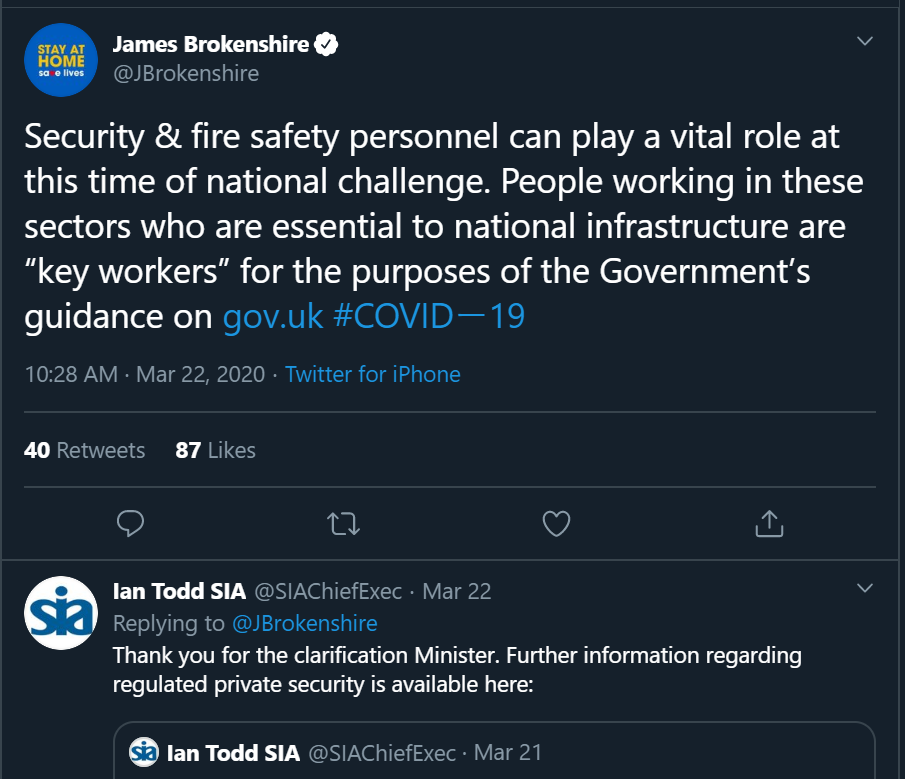
What can we do as an Industry?
Share the message
Click on the button below to download a pdf version of the press release and share this on your website - or tag us on social media.
Download now
Security Industry Authority
The SIA are currently seeking answers to many of the private security industry's questions - read more in the message from their Chief Executive Ian Todd.
Read more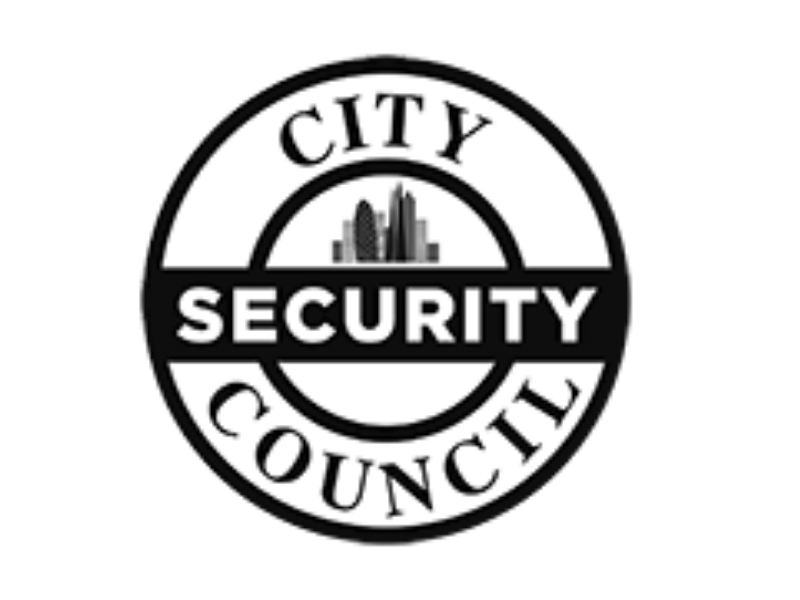
City Security Council
The City Security Council has been working closely with key stakeholders in the City of London to gain London-based security officers essential worker status.
Read more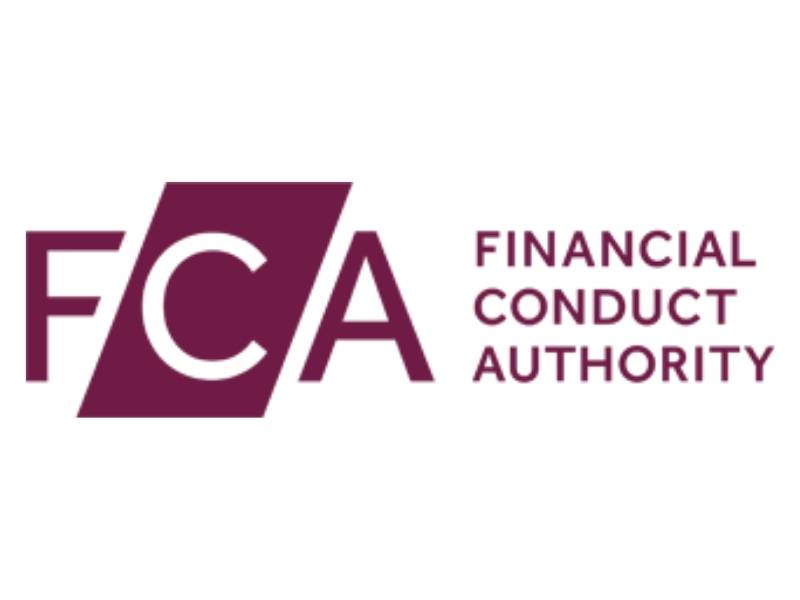
Financial Conduct Authority (FCA)
Click on this link for advice for CViT workers and other key workers within the financial services.
Find out more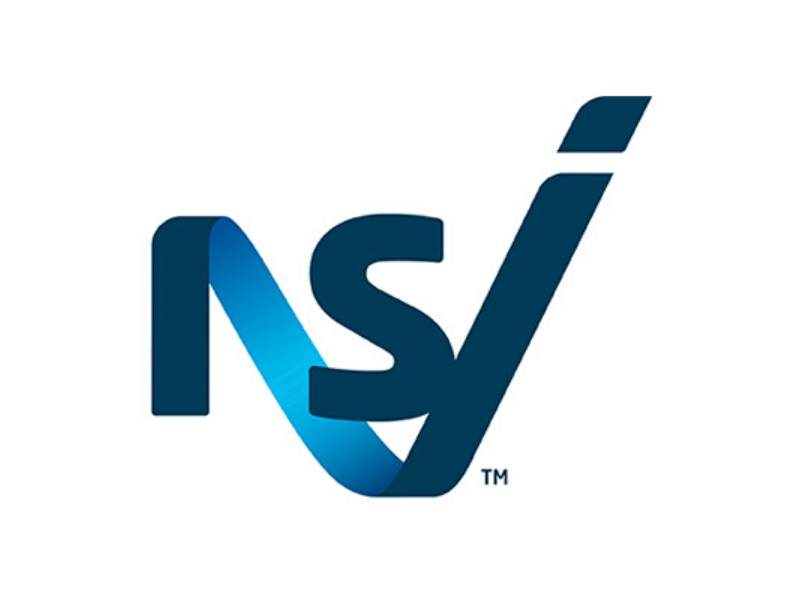
NSI
The National Security Inspectorate (NSI), the UK’s leading UKAS-accredited Certification Body in the security and fire safety sector, is supporting calls for security and fire safety employees to be classified as “key workers”
Find out more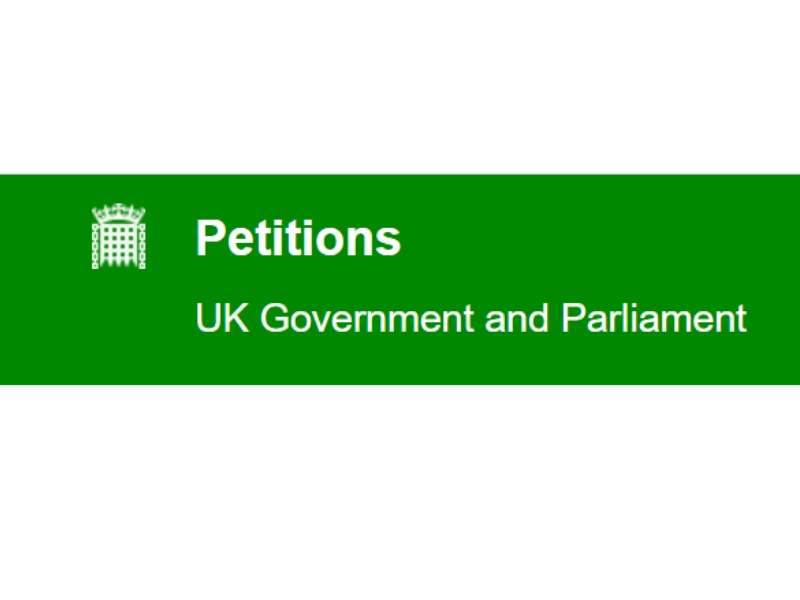
Petitions
There are various petitions surfacing which you are able to sign. Some may need a few days to verify after a number of people have signed them. Click the link to find the petition by Infologue, supported by the BSIA.
Sign hereFurther Updates
22nd March 2020
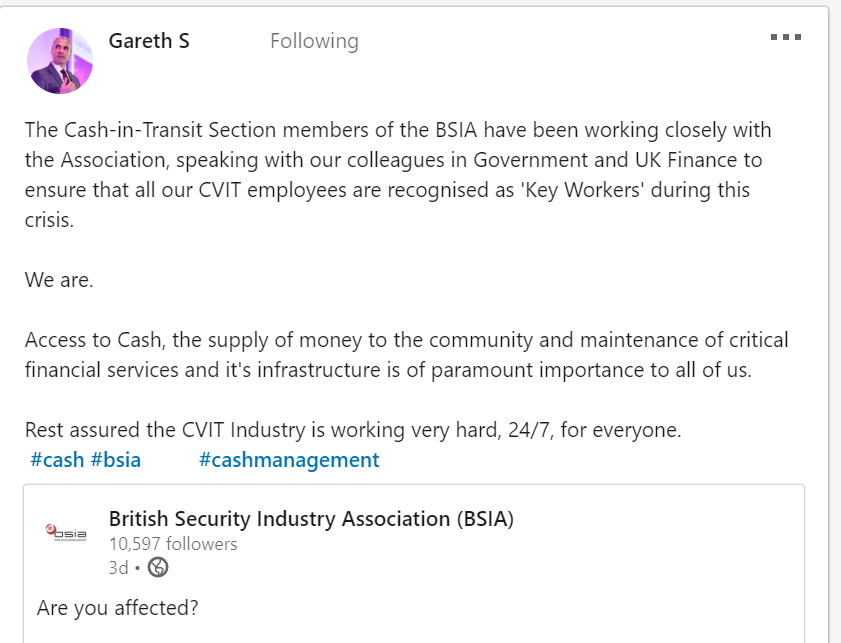
21st March 2020
